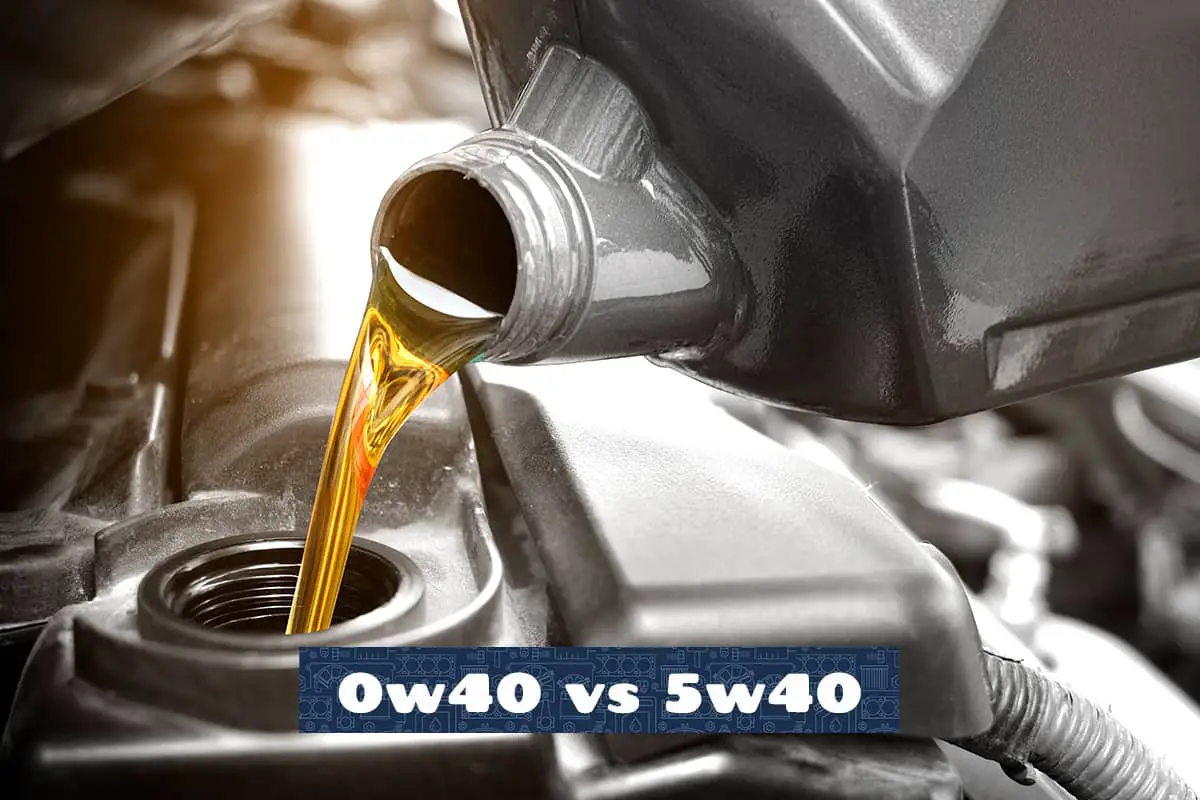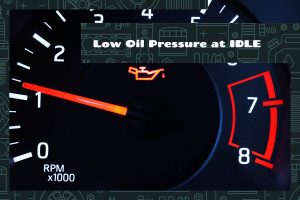With various engine oil options on the market, each promising to deliver exceptional performance and longevity for your vehicle, it’s easy to get lost. Two common choices you might come across are 0W40 and 5W40 engine oils. These oils are specially designed to lubricate your car’s engine and keep things running smoothly. But how do you know which one is right for you?
The primary difference between 0W40 and 5W40 engine oils is their viscosity at cold temperatures. 0W40 oil flows more freely at low temperatures compared to 5W40. This means that 0W40 is generally better for cold starts and cold weather conditions and provides quicker lubrication to engine parts.
In this guide, we will dissect the differences between 0W40 and 5W40 engine oils. We’ll discuss their composition, performance in various weather conditions, and more.
A Quick Rundown on Engine Oil Terminology

When you’re trying to figure out which type of oil is best for your car, understanding engine oil terminology can make your life a lot easier. Let’s briefly decode the jargon and put the complexities in simple terms.
Viscosity Explained
When we talk about engine oil, viscosity is one of the first terms that come up. Viscosity refers to the oil’s thickness and flow characteristics. Thicker oils have higher viscosity and flow slower, while thinner oils have lower viscosity and flow faster. Viscosity impacts how well the oil can lubricate engine parts and how effectively it can flow through the engine.
Explanation of the Numbering and Lettering System in Engine Oils
The code on an engine oil label, like 0W40 or 5W40, is divided into three parts: a number before the letter ‘W,’ the letter ‘W’ itself, and a number after it.
The first number and the ‘W’ indicate the oil’s performance in cold conditions (W stands for winter). A lower first number means better performance in the cold.
The second number indicates the oil’s high-temperature viscosity. Higher numbers here mean the oil will remain thicker at higher temperatures.
Synthetic vs. Conventional Oils
You’ve probably heard terms like ‘synthetic’ and ‘conventional’ used to describe engine oils, and you might be wondering what they mean.
Synthetic oils are engineered in a lab and are designed for optimal performance. They usually offer better high-temperature stability, improve fuel efficiency, and provide longer-lasting engine protection. However, synthetic oils are typically more expensive than their conventional counterparts.
Conventional oils are made from crude oil and go through a refining process. They are generally less expensive but may not offer the high-temperature stability and long-lasting protection that synthetic oils do.
What Is 5W40 Engine Oil?
5W40 engine oil is a multi-viscosity option, formulated to offer solid performance in varying temperatures.
Composition
5W40 is often synthetic, meaning it’s made from artificially engineered compounds. It offers better high-temperature stability and is tailored for optimal engine protection. The synthetic base provides cleaner operation and often includes additives for anti-wear and anti-corrosion benefits.
Optimal Temperature Range
The ‘5W’ indicates that this oil performs well at cold temperatures, but not as well as something like a 0W oil. The ’40’ signifies the oil’s high-temperature viscosity, ensuring it stays sufficiently thick at higher temperatures to maintain lubrication. It’s a good middle-ground oil for climates that experience both warm and cold conditions.
Compatibility
5W40 oil is versatile and is commonly used in a range of engine types, including turbocharged engines. It’s also a go-to for many European cars and high-performance vehicles, which often have specifications requiring synthetic oils for optimal engine function.
What Is 0W40 Engine Oil?
When it comes to engine oils that offer superior cold-weather performance, 0W40 is a popular choice. This multi-viscosity oil is specifically engineered to offer high performance across a range of temperatures.
Composition
The majority of 0W40 engine oils are synthetic, meaning they are chemically engineered for precision and performance. The synthetic formulation is also known for its ability to reduce engine deposits, providing a cleaner and more efficient engine operation.
Climate Versatility
The ‘0W’ in the name means that the oil has been designed to perform extremely well in cold conditions. Lower viscosity at cold temperatures means it flows more freely, allowing it to quickly reach engine components that need lubrication, especially during cold starts.
Although it excels in cold conditions, 0W40 also offers strong performance in high temperatures. The ’40’ in 0W40 indicates the oil’s high-temperature viscosity, meaning it won’t get too thin when things heat up. This ensures that even in hot conditions, the oil maintains a stable film to protect engine components from friction and wear.
0W40 vs 5W40
Both oils have a high-temperature rating of ’40’, making them well-suited for warm conditions. However, they differ mainly in their cold-weather performance, indicated by the ‘0W’ and ‘5W’ in their names.
Cold Weather Performance
0W40 has the edge in colder temperatures. Its lower winter viscosity means that it flows more freely at low temperatures, offering quicker engine protection when you start your car in the cold.
Hot Weather Performance
Both 0W40 and 5W40 offer similar high-temperature performance. They maintain a stable, thicker film at higher temperatures, ensuring good lubrication and protection against wear.
Compatibility and Versatility
Both oils are multi-purpose and widely compatible with different types of vehicles, including high-performance cars. While 5W40 is more common in European cars, 0W40 offers versatility by being equally effective in both gasoline and diesel engines.
Fuel Efficiency
The 0W40 oil may offer a slight edge in fuel efficiency due to its superior low-temperature fluidity, reducing engine drag. However, both oils are engineered to reduce friction and offer excellent lubrication, contributing to decent fuel economy.
Price Point and Availability
Typically, 0W40 oils are pricier than their 5W40 counterparts. This is often due to the more advanced synthetic base and additive package designed for extreme conditions. However, both oils are readily available at auto supply stores and service centers.
Table Summary
| Feature | 0W40 | 5W40 |
| Cold Weather | Excellent | Very Good |
| Hot Weather | Excellent | Excellent |
| Compatibility | High (Gasoline and Diesel) | High (Primarily European Cars) |
| Fuel Efficiency | Slightly Better | Good |
| Price | Generally Higher | Moderately Priced |
| Availability | Widely Available | Widely Available |
FAQs
1. Can I switch from 0W40 to 5W40 without any issues?
Generally, switching between 0W40 and 5W40 should not cause significant issues due to their overlap in compatibility. The key difference lies in their cold-weather performance: 0W40 is slightly better in colder conditions due to its lower viscosity.
Before making any switch, consult your vehicle owner’s manual for specific oil recommendations. If your manual states that both oil grades are suitable, switching should not be problematic.
2. Is one type of oil better for older cars?
Neither 0W40 nor 5W40 is specifically designed for older cars, but certain older models might benefit more from one over the other. Older engines may have more wear and tear could benefit from a slightly thicker oil to seal those gaps and prevent leaks.
In that context, the 5W40 could be a better fit, especially if the car is mostly driven in moderate to warm climates. But if the car’s manual approves, 0W40 can still be used, as its superior low-temperature fluidity may benefit older engines in cold conditions.
3. Is 5W30 engine oil better?
5W30 has lower high-temperature viscosity compared to both 0W40 and 5W40, which means it’s thinner at high temperatures. This could offer slight advantages in fuel efficiency, but it may not provide the same level of protection under extreme heat or load conditions. As such, if you own a high-performance vehicle or one that requires a higher viscosity for full protection, 0W40 or 5W40 might be more suitable.






